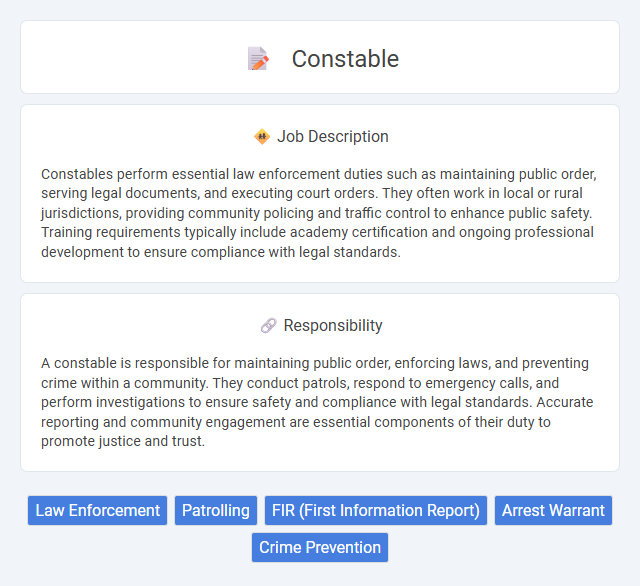
Constables perform essential law enforcement duties such as maintaining public order, serving legal documents, and executing court orders. They often work in local or rural jurisdictions, providing community policing and traffic control to enhance public safety. Training requirements typically include academy certification and ongoing professional development to ensure compliance with legal standards.
Individuals with a strong sense of duty, resilience, and a calm demeanor under pressure will likely find a constable job suitable. Those who are uncomfortable with high-stress situations or physical confrontation may struggle to meet the demands of the role. The probability of success increases for candidates who are empathetic, disciplined, and capable of making quick, fair decisions.
Qualification
Constable candidates must typically possess a high school diploma or equivalent, with some departments requiring additional qualifications such as physical fitness standards and background checks. Specialized training programs and police academy certification are essential for developing law enforcement skills and legal knowledge. Advanced qualifications, including prior military service or completion of criminal justice coursework, can enhance employment prospects and career advancement opportunities.
Responsibility
A constable is responsible for maintaining public order, enforcing laws, and preventing crime within a community. They conduct patrols, respond to emergency calls, and perform investigations to ensure safety and compliance with legal standards. Accurate reporting and community engagement are essential components of their duty to promote justice and trust.
Benefit
A constable job likely offers stable employment with government benefits such as health insurance, pension plans, and paid leave. Opportunities for career advancement and specialized training may enhance long-term earning potential. Job security and community respect also tend to be notable advantages in this profession.
Challenge
A constable's job likely involves navigating unpredictable and high-pressure situations that require quick decision-making and strong problem-solving skills. There may be frequent exposure to risk, conflict, and emotional stress, which can challenge both physical and mental resilience. The role probably demands continuous training and adaptability to effectively manage various law enforcement duties and community interactions.
Career Advancement
Constable positions offer clear career advancement paths through rank promotions such as sergeant, inspector, and chief constable, often based on experience, performance, and additional training. Specialized units in fields like cybercrime, forensics, or drug enforcement provide opportunities to develop expertise and enhance career prospects. Continuous professional development courses and leadership programs further support progression within law enforcement agencies.
Key Terms
Law Enforcement
Constables play a crucial role in law enforcement by maintaining public order, executing warrants, and serving legal documents at the local level. They assist in crime prevention, conduct investigations, and support higher law enforcement agencies in rural and small communities. Their responsibilities often include traffic control, courtroom security, and collaboration with sheriff's departments to uphold justice and public safety.
Patrolling
Constables play a crucial role in maintaining public safety through regular patrolling of assigned areas, which helps deter crime and ensures immediate response to incidents. Their presence on foot or in vehicles allows them to monitor suspicious activities, enforce laws, and provide assistance to the community. Effective patrolling by constables enhances neighborhood security and fosters strong relationships between law enforcement and citizens.
FIR (First Information Report)
A constable plays a crucial role in registering and investigating the First Information Report (FIR), a legally binding document that initiates the criminal justice process. Their responsibilities include recording accurate details from the complainant, verifying preliminary facts, and promptly forwarding the FIR to the higher authorities for further action. Effective management of FIRs by constables ensures timely investigation and upholds public trust in law enforcement.
Arrest Warrant
A constable plays a crucial role in executing arrest warrants issued by courts, ensuring lawful detention of individuals accused of crimes. Their responsibilities include verifying warrant details, locating the subject, and safely carrying out arrests while respecting legal protocols. Expertise in warrant procedures and adherence to jurisdictional rules are essential for effective constable operations in law enforcement.
Crime Prevention
Constables play a crucial role in crime prevention by conducting regular patrols, engaging with community members, and identifying potential threats before they escalate. They utilize intelligence-gathering techniques and collaborate with local organizations to implement proactive measures that deter criminal activity. Effective crime prevention by constables contributes to safer neighborhoods and enhanced public trust in law enforcement.
 kuljobs.com
kuljobs.com